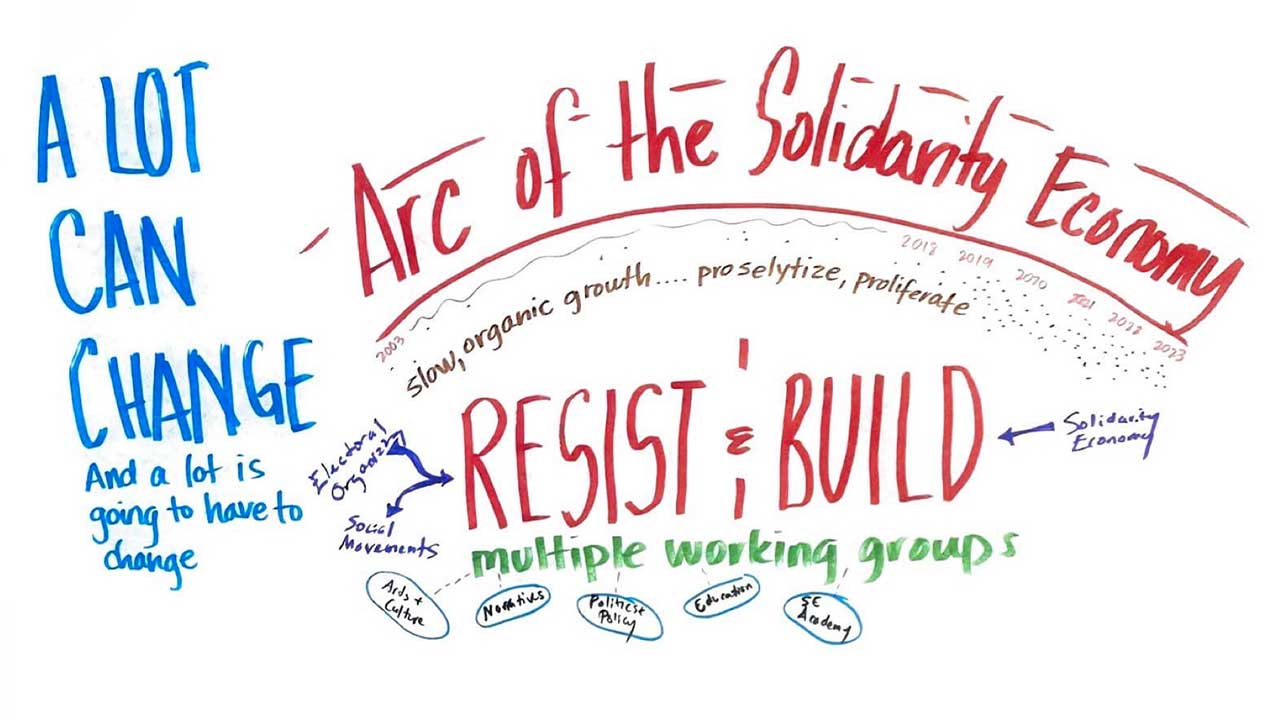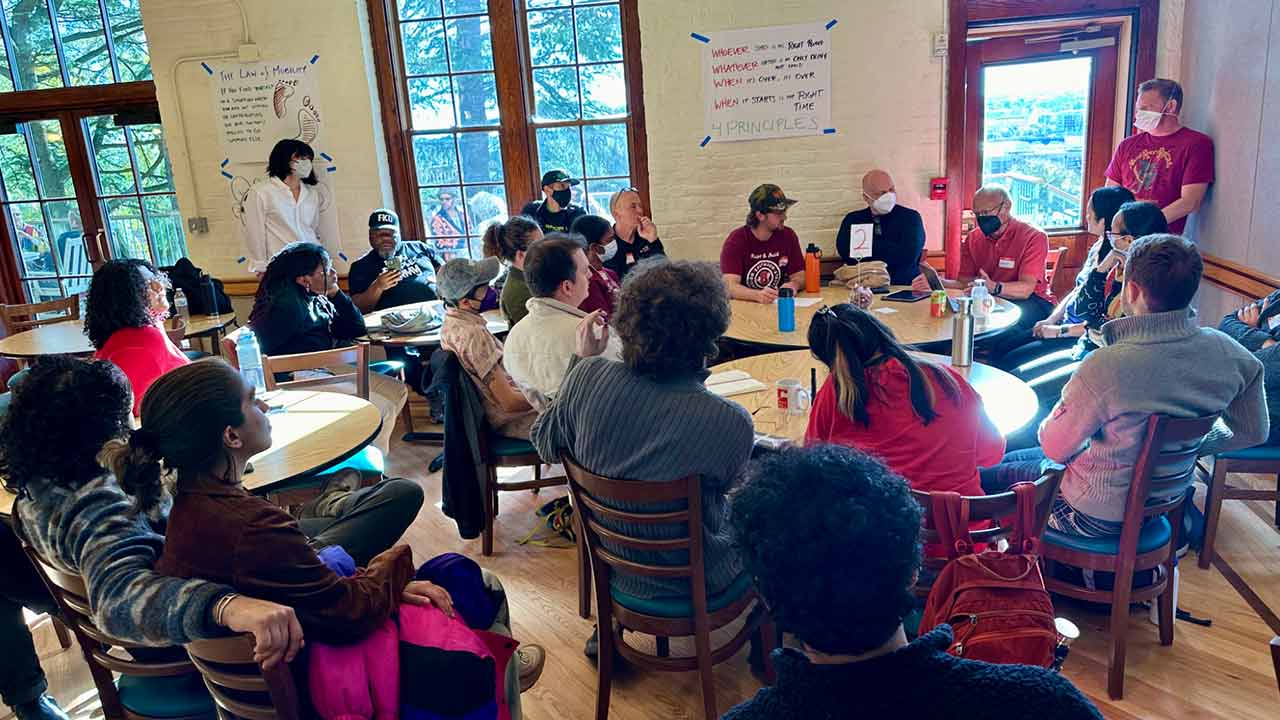On the weekend of October 20th, 2023 two CUNY graduate students affiliated with the Community and Worker Ownership Project (CWOP) at the School of Labor and Urban Studies traveled to Richmond, Virginia to attend the Resist & Build Summit, organized by the US Solidarity Economy Network. Dozens of leading organizations in the national solidarity economy (SE) movement attended, with the aim of collectively building up the movement. Some key goals were to create agreement around a theory of change, develop strategic aims, and establish relationships between the attendees and their organizations.
Although the gathering itself occurred at a location in time and space, the organizers were very clear that Resist & Build is an ongoing process, not a one-time event. Indeed, we may understand this gathering in the context of a longer timeline that, perhaps, begins with the emergence of the term “Solidarity Economy” in Latin America and Europe in the mid-1980s and runs through the consolidation of international and national SE networks following the first World Social Forum in 2001 and the US Social Forum in 2007. Although the SE umbrella covers a range of theories of change, one thing that holds SE-identified organizations together is a vision for a post-capitalist future. Most, if not all, SE-identified projects agree that capitalism, as a system oriented towards the private accumulation of profit, is detrimental for both “people and planet” and must be urgently transformed. The “Resist & Build” term signals the dual approach of SE movements: we must challenge capitalist economic activity by developing concrete alternatives. That is, we must satisfy basic human material, social, and cultural needs through collective practices oriented not around profit but cooperation, well-being, democracy, sustainability, and justice.
Kali Akuno is a co-director of Cooperation Jackson in Mississippi who has, for example, expanded upon these ideas by arguing that the solidarity economy is a step towards eco-socialism. He kicked off October’s gathering with a few remarks about the urgency of these times. Fascism is on the rise, here in the United States and globally. Meanwhile, racism, patriarchy, class exploitation, and imperialism continue to shape the status-quo. Given the sheer scale of these crises, many advocates of social justice turn to the state to defend the rights of people. However, proponents of SE, like Akuno, often argue that the primary function of the state is to advance the interests of the rich and powerful. In order to create transformational change that centers those who experience these crises most acutely, solidarity economy approaches foreground participatory democracy and collective self-determination to directly empower communities to meet their own needs. This wasn’t just talk, but an ethos put into practice throughout the weekend in the breakout groups, fishbowls, and general assembly.
Aside from the brief opening remarks and a presentation on community production by Blair Evans, the Resist & Build gathering comprised a deliberative process that reflected the diverse backgrounds and perspectives of the attendees. With so many social movement organizers present from around the country–from housing organizers struggling to reclaim vacant property through squatting, to Native organizers advocating for the creation of indigenous-led Community Land Trusts, to worker-owners and members of a myriad of cooperatives– in addition to researchers studying the solidarity economy, there was a wealth of knowledge about the amazing work already happening to bring a new, more just world into being.
One problem facing the SE movement, globally, is that many of these projects remain isolated. In order to create broad-based alternatives capable of addressing the systemic crises we face, it is imperative that these diverse SE initiatives connect with each other. Forming the connective tissue between existing movements was a key theme of the weekend and a central point of ongoing organizing, given the SE strategy of building supply and value chains exempt (to the extent possible) from capitalist circuits. Another recurring, and related, theme was the challenge in building up or “scaling” the solidarity economy movement to a critical “systemic” mass. The more effective solidarity economy projects are at meeting people’s needs and demonstrating a more just economy is possible, the thought goes, the more it will attract everyday people to join. Inspiring this social agency is a critical task of contemporary organizing.
As we were reminded throughout the weekend, Resist & Build is a process, not an event. This means that Resist & Build did not end on October 22nd, but that we will continue resisting the oppressive world system that is destroying the planet–and building the future we deserve. The objectives that were developed that weekend emerged from a democratic process of discussion and deliberation. This aligns with the SE movement’s contention that the way in which decisions are made are just as important as the decisions themselves. Resist & Build centers a process of collective self-determination so that all people’s voices are heard, especially those who have been historically marginalized. As we all went back to our homes after the gathering ended, we continue to do our local organizing while networking with our Resist & Build comrades. Future gatherings will build on this work. Ultimately, Resist & Build does not seek to become an organizational container for these local and regional projects, but a way of linking them to facilitate mutual aid and collaboration between movements.
CWOP largely shares the vision and principles of Resist & Build. Going forward, CWOP will continue to pursue these aims while working to foster cooperativism and solidarity economy in NYC and beyond. Shortly after returning from Richmond, CWOP joined the New York State Community Equity Agenda coalition. The coalition is pushing for a NYS public bank, an end to redlining and other discriminatory economic practices, and the development of worker-owned cooperatives across the state. Furthermore, CWOP is working to create a space for CUNY students, especially those at the School of Labor & Urban Studies, to participate in the movement through their studies as well as extra-curricular organizing. We look forward to deepening our knowledge about, commitment to, and relationships within the solidarity economy movement in NYC and beyond.




